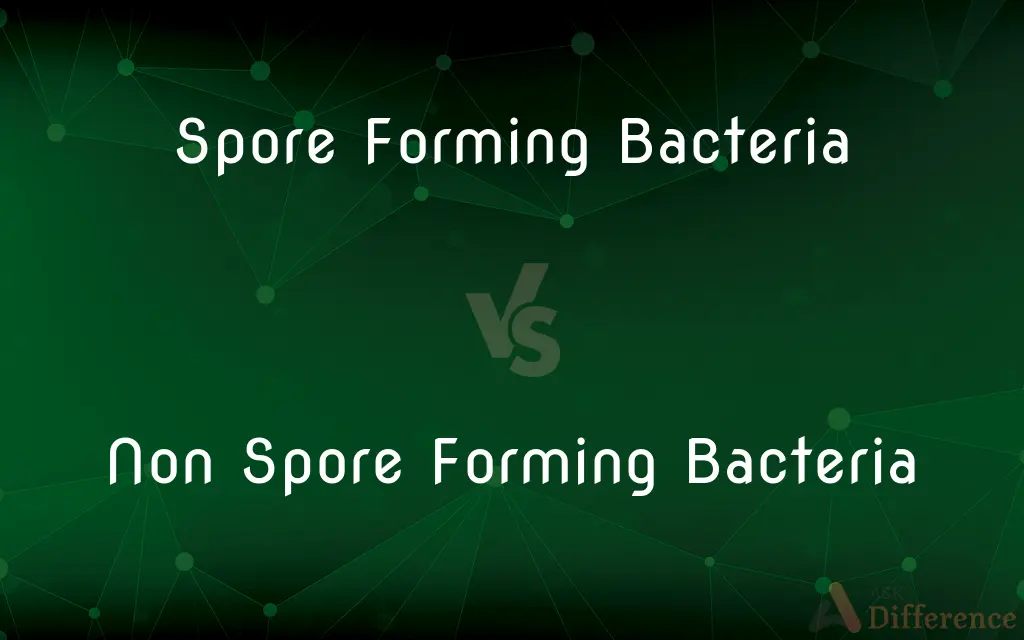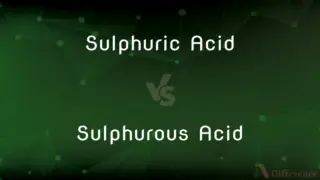Spore Forming Bacteria vs. Non Spore Forming Bacteria — What's the Difference?
By Tayyaba Rehman — Published on December 18, 2023
Spore Forming Bacteria produce resistant spores for survival, while Non Spore Forming Bacteria do not form spores.

Difference Between Spore Forming Bacteria and Non Spore Forming Bacteria
Table of Contents
ADVERTISEMENT
Key Differences
Spore Forming Bacteria have the unique ability to produce tough, dormant, and non-reproductive structures called spores. In contrast, Non Spore Forming Bacteria lack this capability and do not produce these resistant forms.
In unfavorable conditions, Spore Forming Bacteria will produce spores to protect their genetic material, allowing them to survive extreme environments. On the other hand, Non Spore Forming Bacteria typically survive adverse conditions by other means, such as forming biofilms or undergoing metabolic adjustments.
The spores produced by Spore Forming Bacteria are resilient to heat, radiation, and chemicals, ensuring their survival until conditions become favorable again. Non Spore Forming Bacteria, without this spore protection, are generally more susceptible to unfavorable conditions and might perish if the stress is too prolonged or extreme.
Some well-known Spore Forming Bacteria include Bacillus and Clostridium species. These bacteria can remain dormant for extended periods before reviving and resuming their normal functions. In contrast, Non Spore Forming Bacteria such as Escherichia coli or Staphylococcus aureus remain in their typical bacterial form and do not enter a dormant spore state.
Spore Forming Bacteria typically use their spores as a survival mechanism, not for reproduction. This is different from fungal spores or plant seeds which are reproductive structures. Non Spore Forming Bacteria continue their life cycle without the formation of these protective structures.
ADVERTISEMENT
Comparison Chart
Spore Formation
Can produce resistant spores.
Do not produce spores.
Response to Unfavorable Conditions
Form spores to survive extreme conditions.
Rely on other survival mechanisms.
Resistance
Spores are resistant to heat, radiation, and chemicals.
Generally more susceptible to harsh conditions.
Example Species
Bacillus, Clostridium
Escherichia coli, Staphylococcus aureus
Reproductive Role
Use spores for survival, not reproduction.
Reproduce without forming spores.
Compare with Definitions
Spore Forming Bacteria
Spore Forming Bacteria are microbes that produce protective spores.
When conditions are harsh, certain bacteria like Bacillus anthracis form resistant spores.
Non Spore Forming Bacteria
Non Spore Forming Bacteria lack the mechanism to create resistant, non-reproductive structures.
Neisseria gonorrhoeae, responsible for gonorrhea, remains in its bacterial form without forming spores.
Spore Forming Bacteria
Bacteria that utilize spore formation as a response to environmental stress are termed Spore Forming Bacteria.
To survive extreme heat, certain bacteria like Bacillus stearothermophilus will form heat-resistant spores.
Non Spore Forming Bacteria
Non Spore Forming Bacteria are microbes that don't produce protective spores.
Escherichia coli, commonly found in the intestines, is a Non Spore Forming Bacterium.
Spore Forming Bacteria
Spore Forming Bacteria have a survival mechanism involving the creation of tough, non-reproductive structures.
Clostridium botulinum, the bacterium responsible for botulism, forms spores that can survive canning processes.*
Non Spore Forming Bacteria
Microbes that continue their life cycle without resorting to spore formation are termed Non Spore Forming Bacteria.
Streptococcus pneumoniae, which can cause pneumonia, doesn't form spores in any life stage.
Spore Forming Bacteria
Spore Forming Bacteria can produce structures that endure unfavorable conditions until they return to a favorable state.
In the presence of disinfectants, some bacteria like Clostridium difficile may produce spores to survive.
Non Spore Forming Bacteria
Non Spore Forming Bacteria always stay in their typical bacterial form, regardless of environmental conditions.
Helicobacter pylori, known for stomach infections, remains spore-free throughout its existence.
Spore Forming Bacteria
Bacteria that can transition to a dormant state by forming spores are known as Spore Forming Bacteria.
In soil, Bacillus subtilis can produce spores to withstand dry periods.
Non Spore Forming Bacteria
Bacteria that always remain in their active form without transitioning to a dormant spore state are known as Non Spore Forming Bacteria.
Staphylococcus aureus, a skin colonizer, doesn't produce spores even under stress.
Common Curiosities
What are Spore Forming Bacteria?
Spore Forming Bacteria are microbes that produce resistant spores as a survival mechanism.
How can one differentiate between Spore Forming and Non Spore Forming Bacteria?
One can differentiate based on their response to extreme conditions: Spore Forming Bacteria form resistant spores, while Non Spore Forming Bacteria do not.
Are all bacteria either Spore Forming or Non Spore Forming?
Yes, based on the capability to form spores, bacteria are classified as either Spore Forming or Non Spore Forming.
Are the spores formed by Spore Forming Bacteria reproductive structures?
No, the spores formed by Spore Forming Bacteria are for survival, not reproduction.
Can Non Spore Forming Bacteria survive harsh conditions?
Non Spore Forming Bacteria might use other survival mechanisms, like forming biofilms, but they don't form protective spores.
Do Non Spore Forming Bacteria produce any spores?
No, Non Spore Forming Bacteria do not have the capability to produce spores.
Why do Spore Forming Bacteria produce spores?
Spore Forming Bacteria produce spores to protect their genetic material and survive in unfavorable conditions.
Are spores of Spore Forming Bacteria always resistant to heat?
While spores of Spore Forming Bacteria are generally heat-resistant, the degree of resistance can vary among species.
How long can Spore Forming Bacteria remain dormant?
Spore Forming Bacteria can remain dormant for extended periods, sometimes years or even decades, until conditions become favorable again.
Do Non Spore Forming Bacteria have any advantage over Spore Forming ones?
While Non Spore Forming Bacteria don't form protective spores, they may reproduce faster or adapt in other ways to survive in their environments.
Can Non Spore Forming Bacteria become Spore Forming?
No, the ability to form spores is a genetically determined trait and cannot be acquired by Non Spore Forming Bacteria.
Are Non Spore Forming Bacteria less important than Spore Forming ones?
No, both Spore Forming and Non Spore Forming Bacteria have their roles in nature, and their importance isn't based on their spore-forming capability.
Are all Spore Forming Bacteria harmful?
No, while some Spore Forming Bacteria can be pathogenic, many are harmless or even beneficial.
Can we find both Spore Forming and Non Spore Forming Bacteria in the same environment?
Yes, many environments, like soil, can have a diverse mix of both Spore Forming and Non Spore Forming Bacteria.
How can one destroy the spores of Spore Forming Bacteria?
High heat (as in autoclaving) or specific chemicals can be effective against spores of Spore Forming Bacteria.
Share Your Discovery

Previous Comparison
Audit Plan vs. Audit Programme
Next Comparison
Gorilla Glass vs. Dragontrail GlassAuthor Spotlight
Written by
Tayyaba RehmanTayyaba Rehman is a distinguished writer, currently serving as a primary contributor to askdifference.com. As a researcher in semantics and etymology, Tayyaba's passion for the complexity of languages and their distinctions has found a perfect home on the platform. Tayyaba delves into the intricacies of language, distinguishing between commonly confused words and phrases, thereby providing clarity for readers worldwide.















































